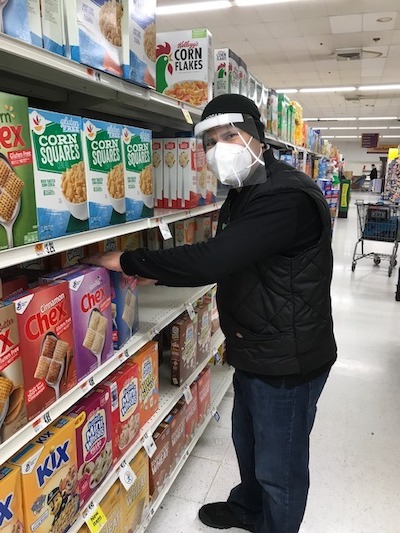As the nation tries to emerge from the shadow of COVID-19, the virus remains a key concern for essential frontline workers in the food, grocery and other industries, a study by United Food and Commercial Workers International (UFCW) and the University of Nebraska Medical Center (UNMC) finds.
For the research, UFCW and UNMC conducted monthly surveys of 17,617 UFCW members in all 50 states from June 2021 to May 2022. Data from respondents showed that, from July 2021 to May 2022, COVID infection rates rose from 2% to 15% among UFCW members, including grocery, health care, meat packing and processing, and other food employees. Those rates of infection were 10 times higher than U.S. incidence rates over the same span, UFCW noted.
Union members reporting COVID infections before May 2021 were twice as likely to catch the virus again in the past year, the survey revealed. Respondents also were hit hard by the surge of the virus’ Omicron variant earlier this year. In February, 45% of those who tested positive for COVID said they had contracted it recently.
 Data compiled independently by UFCW counts at least 505 deaths from COVID and 131,295 infections or exposures to the virus to date. (Photo courtesy of UFCW International)
Data compiled independently by UFCW counts at least 505 deaths from COVID and 131,295 infections or exposures to the virus to date. (Photo courtesy of UFCW International)
Among UFCW members who caught COVID, 59% believed they likely contracted the virus in their workplace. Two-thirds of respondents think COVID vaccines should be required, yet only 13% said their employers had a vaccination mandate in place at the end of summer 2021. Similarly, in July 2021, 75% of respondents believed that customers weren’t taking the ongoing threat of COVID infection seriously enough.
The poll showed that vaccination rates increased among UFCW members. In the summer and early fall of 2021, 88% of UFCW members who received COVID immunizations were at least partially vaccinated, and respondents were more likely to receive primary and booster COVID shots than the general population by a rate of 20% or more. By January 2022, half of all respondents were fully vaccinated and boosted.
“This UNMC study makes clear that COVID-19 has — and continues to have — a serious and significant impact on America’s essential workers,” UFCW International President Marc Perrone said in a statement. “The UFCW is calling on Congress, the Biden administration, and states and localities to take bolder steps and policy actions to better address the impact of the pandemic and to help protect workers from future pandemics.”
To date, the UFCW membership has totaled at least 505 deaths from COVID-19 and at least 131,295 infections or exposures to the virus among frontline workers nationwide, according to the latest data compiled independently by UFCW.
“These essential workers paid a hefty price for continuing to do their jobs, which kept food on American families’ tables and our economy moving throughout the pandemic. They deserve immediate action as they continue to confront ongoing risk and the nation’s recognition for their service,” Perrone added.
During the initial months of the study with UNMC, 90% of COVID-infected respondents reported missing work for an average of 20 days. About 20% of those with the virus said they visited an emergency room, and 6% had to be hospitalized — a much higher rate than the 2% national rate of hospitalization, UFCW said. More than 12% of those infected with COVID said it took them over four months to feel “back to normal,” and 4% said they were unable to return to work after contracting the virus. And as of May 2022, half of respondents reported that their lives remain “deeply impacted” by COVID.
UFCW said that, in response to the findings, the union is amplifying its call for the following actions to be taken immediate to safeguard the health and safety of essential frontline workers:
• Ensure essential workers in every industry have access to dedicated paid sick leave that protects their employment status when dealing with infection.
• Immediately move on legislation, such as the America’s Meatpacking Workers Act, to protect some of the most vulnerable workers in the hardest-hit industries.
• Implement a nationwide Occupational Safety and Health Administration (OSHA) infectious disease standard and hold accountable employers that do not take steps to protect essential workers during pandemics.
“The unique partnership with UFCW has recorded the full scope of the markedly increased risk of COVID infections among union essential workers,” according to Ali Khan, M.D., dean of the College of Public Health at UNMC. “Policies to protect these essential workers are critical to weathering the current surge of COVID cases nationwide and being ready for the next pandemic.”
Among the study respondents, 73% were in grocery, 8% in health care, 3% in meat packing and processing, and 2% in other food occupations. Overall, UFCW International represents 1.3 million workers and their families in the grocery store, health care, meatpacking, food processing, retail and other industries in the United States, Canada and Puerto Rico.


